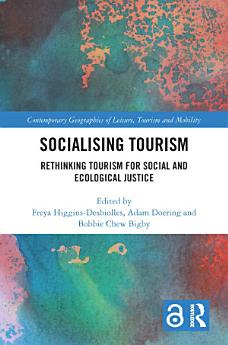Socialising Tourism: Rethinking Tourism for Social and Ecological Justice
About this ebook
Socialising Tourism means reorienting travel and tourism based on the rights, interests, and safeguarding of traditional ecological and cultural knowledges of local peoples, communities and living landscapes. This means making tourism work for the public good and taking seriously the idea of putting the social and ecological before profit and growth as the world re-emerges from the COVID-19 pandemic. This is an essential first step for tourism to be made accountable to the limits of the planet. Concepts discussed include Indigenous culture, toxic tourism, a "theory of care", dismantling whiteness, decolonial tourism and animal oppression, among others, all in the context of a post-COVID-19 world.
This will be essential reading for all upper-level students, academics and policymakers in the field of tourism. The Introduction of this book is freely available as a downloadable Open Access PDF under a Creative Commons Attribution-Non Commercial-No Derivatives 4.0 license available at http://www.taylorfrancis.com/books/9781003164616
About the author
Freya Higgins-Desbiolles is a Senior Lecturer in Tourism Management, UniSA Business, University of South Australia and adjunct Associate Professor, Department of Recreation and Leisure, University of Waterloo, Canada. She has worked with communities, non-governmental organisations and businesses that seek to harness tourism for sustainable and equitable futures. She is one of the Founding members of the Tourism Alert and Action Forum. She has won awards for engaged research, media engagement and research and teaching excellence.
Adam Doering is an Associate Professor in the Faculty of Tourism at Wakayama University, Japan. He is a Steering Committee Member of the Critical Tourism Studies Asia Pacific (CTS-AP) research network and has published broadly on the philosophy and ethics in tourism and travel, lifestyle sports and tourism in East Asia and critical analyses of Destination Management Organisations policies in the context of Japan. His current research examines lifestyle sports and tourism development in polluted, post-disaster and pandemic impacted coastal ecologies in rural Japan.
Bobbie Chew Bigby (Cherokee Nation) is a PhD student at the Nulungu Research Institute, University of Notre Dame Australia. Bobbie’s research looks at the possibilities of tourism as a tool for Indigenous cultural, language and environmental justice. Her past research fellowships, including a Fulbright award and Rotary Peace Fellowship, have taken her to Indigenous Australia, China, India, Cambodia and Burma for research and community-based work. For her PhD research, Bobbie rotates her time between Broome, Western Australia and her own Tribal Nation in Oklahoma, USA.




